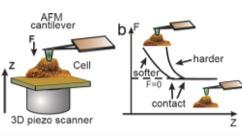Cell Mechanics CEMSLAB: cellular engineering microsystems laboratory
Description
In normal physiology, cells generate and sustain mechanical forces. They are active materials that can detect mechanical stimulation by the activation of mechanosensitive pathways and react to physical signals through cytoskeletal re-organization and force generation. Genetic mutations and pathogens that disrupt the cytoskeletal architecture can result in changes to cell mechanical properties such as elasticity, adhesiveness, and viscosity. These transformations are often a hallmark and symptom of a variety of pathologies.
Consequently, there is a need for experimental techniques and theoretical models adapted from soft matter physics and materials engineering to characterize cell mechanical properties. In this laboratory interdisciplinary research, combining engineers and biologists, paves the way for broadening our understanding of cell mechanics and its role in development, physiology, and disease.
The cells mechanical properties related to mechanical stimulation and/or genetic mutations are measured. Individual cells are analyzed through MEMS (Micro Electro Mechanical System) and atomic force microscopy with nanometer resolution, at the same time prototypes for studying cell populations are designed, subsequently texts of vitality, gene expression, etc. are performed
Keyword 1: Biophysics
Keyword 2: Cells mechanical properties
Keyword 3: Genetic mutations
Keyword 4: Viscoelasticity
Keyword 5: citoskeleton
Head of the research group
List of members in the research group
Orfeo Sbaizero - PO - Ing Ind/22
Research projects
Molecular and cellular dissection of inflammation and tissue repair in Arrhythmogenic Cardiomyopathy - PRIN
Name of the laboratories
CEMSLAB: - Atomic Force Microscopy (AFM)




